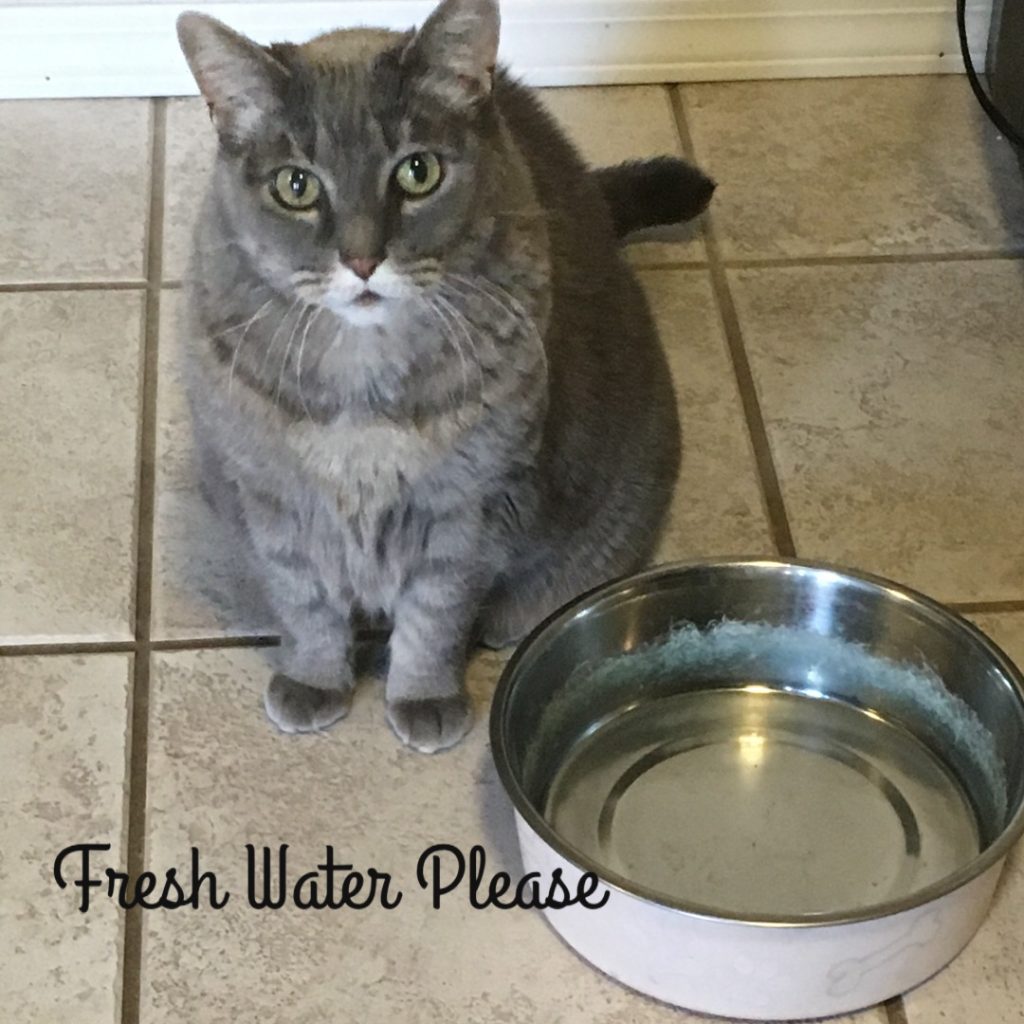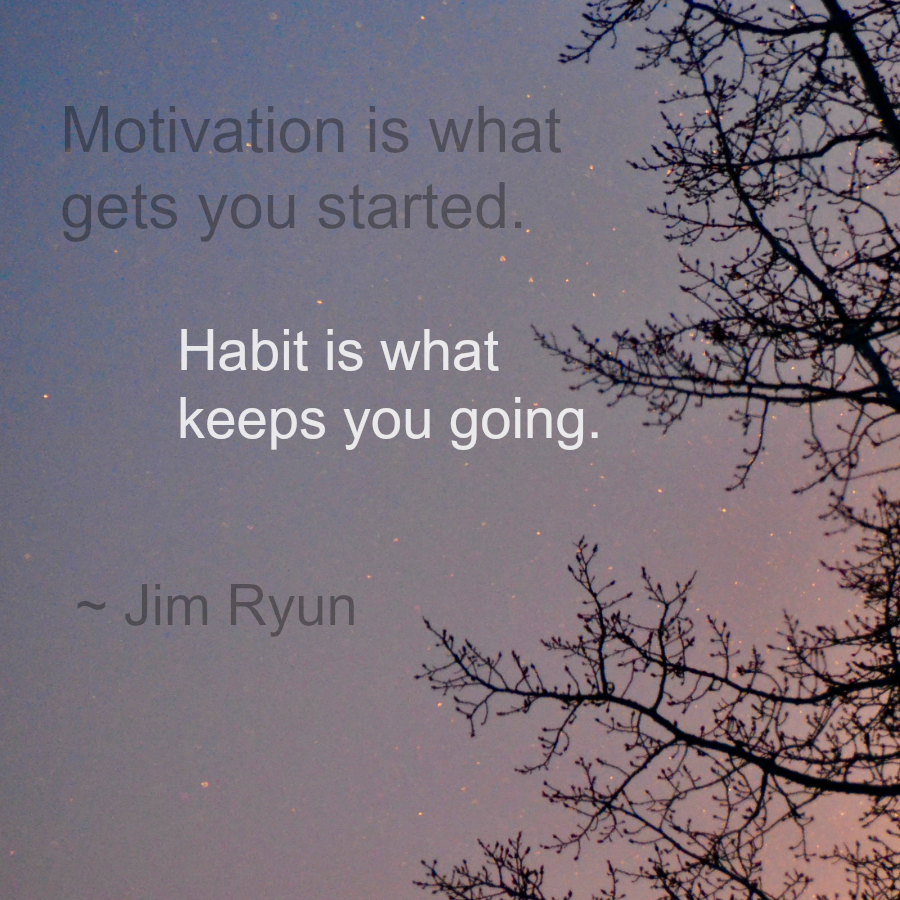Habits can make us or break us!
While bad habits hold us back. Good habits blaze a path forward.
Is there a habit that you know would make your life easier or would improve the quality of your life? If so, this post’s for you because it’s about harnessing the power of habits.
Have you ever wondered what it would be like without habits?
You might be thinking:
Yes! Freedom! The tyranny of habits is gone. Spontaneity reigns.
But wait a minute.
What would our lives really be like?
It may read more like a dystopian nightmare than a utopian dream.
Think about it. If we didn’t have habits, our lives would be chaotic. From the moment we got up until we went to bed, we’d be making decisions based on whatever trigger was dominant at the time.
First, we’d have to decide what desire was being triggered, then we’d have to decide what to do about it.
Hopefully we’d wake up each morning at a decent time. There’d be no setting of the alarm clock unless something triggered you to set the alarm the night before. But why would you? It’s not a habit.
A look at life without habits
You’re awake now. Woken by your body or your baby or your dog. Tired and indecisive, you might be running late but who really knows? What do you do next? Need drives action. What’s the dominate need and what’s going to alleviate it with the least amount of effort?
- Brush your teeth?
- Drink water?
- Exercise?
- Check social media?
- Feed the crying baby?
- Let the dog out?
- Drink coffee?
- Climb back into bed because your brain is already into overwhelm with all the decisions that face you in just the first five minutes of waking up?
Now imagine going through the rest of the day like that.
Not even morning coffee would be a habit so you’d discover that morning pick-me-up at random. Open the cupboard door and see the coffee. Right. Coffee. Let’s make some. Ummm. Good.

Good things don’t usually happen by chance
This day without habits is spent looking for your keys or your wallet. Your laundry doesn’t get folded and put away because it’s easier for everyone to rummage through the pile looking for what’s theirs instead of going room to room searching for something to wear.
Habit sorts clothes and puts them into the appropriate closet. Habit hangs the keys in the same place and sets the alarm.
List makers would probably still make lists, but wouldn’t use that list the next day because each day is a reset to default. Using the same list, or parts of the list would be habit. Each night, that list would become a blank slate.
Life without habits would lead to a constant state of overwhelm
Routine and habits reduce overwhelm because they automate our lives and decrease decision making. If we don’t make habits of repeatable tasks we leave it to chance and our time is usurped by whatever need is most urgent at that moment in time.
Even the most resistant of us have habits and routines in our lives.
You’ve experienced the freedom that comes when you’ve accomplished what you’ve set out to do. That satisfaction. The room in your brain cleared for calm because there aren’t a million things clamouring for your attention?
Habits can give you more of that
Habits take triaging out of the picture. How much of your day do you waste triaging? You know you should exercise but you also need to do x, y, and z so you put it off determining you will do it after. But…
‘After’, you discover, is like ‘tomorrow’. It never comes.
Finding ever after.
Knowing our ‘because’, we create our own happy by putting one foot in front of the other and making our pathway to habit.
Not every habit has an exact timetable but we’ve trained our eye to recognize the pattern that triggers the habit and leads to follow through.
Let’s take plants as an example. Depending on the season and the weather, our watering schedule is flexible, based on the plants needs. We develop a habit based on a pattern of recognizing need, responding, and reward.
Other habits are static. We give the cat fresh water everyday and usually at the same time because if we don’t she pulls her water dish away from the wall, thus blocking our normal pathway across the room. She sits there looking at us expectantly every time we step over her.

Yes, that’s our cat, Maddie. True story. In this case, she’s habituating us, but the pattern is similar to the one above. Need, response, reward.
21 times/days to form a habit is not accurate
Have you faithfully repeated a behaviour for 21 times, believing popular wisdom that a mere three weeks of repeating the same behaviour will result in a habit as automatic as breathing?
I have too. Discovering that day 22 is as difficult as day 3 is a huge disappointment, making it easier to quit than to persist.
So where did the myth of 21 days come from?
The 21-day myth began as a populist misunderstanding of cosmetic surgeon, Dr. Maxwell Maltz’s work on self-image. Maltz did not perpetuate the notion that 21 days of task completion forms a habit. Rather he observed that it took about 21 days for a person to adjust to their new look brought about by surgery.
This observation was adopted by an eager population and generalized to the acquisition of habits.
A more accurate time-frame to expect when internalizing a new routine or habit is 2 – 8 months. This length of time depends on the complexity of the habit you’re working to establish.
Regardless of what the habit is, it’s important to understand and support your acquisition with sound principles of change. Habits are more than just repeating a behavior for a requisite number of times. There’s a sequence to follow, otherwise we’re just spinning our wheels.
Any behaviour that you believe is valuable enough that you want to repeat it without having to remind and/or fight yourself to do it, will take deliberate effort.
How to Create a New Habit
1. What habit will enhance your life?
Desire drives habits.
In The Willpower Instinct: How Self-Control Works, Why it Matters, and What You Can Do to Get More of it, Kelly McGonigal Ph.D. writes, “Anything we think is going to make us feel good will trigger the reward system.” Dopamine is released in anticipating, but not experiencing reward.”
Simply being aware that dopamine is released through anticipation leads to a useful hack.
- Identify the desire that drives this habit – simplify your life, become fit?
- Determine the trigger – this can be a particular time, a picture or note on a mirror, a notification in your phone . . .
- Devise an ‘anticipatory’ message about your habit. The brain is highly responsive to suggestion and will work with you rather than against you. Actions follow thoughts.
2. Establish a response – just start
In The 5 Second Rule: Transform Your Life, Work, and Confidence with Everyday Courage, Mel Robbins states “if you don’t act on a thought (or trigger) within 5 seconds, the brain will devise an excuse”. If we count forwards we can count for infinity, so she suggests counting backwards so there’s a finish line.
5-4-3-2-1 Start!
Robbins says that even a slight hesitation will send a stress signal to the brain and the moment for action is lost. Small actions, she writes, such as counting down and physically moving toward the task, are very effective in establishing habits.
3. Plan a reward and track your behaviours
Be purposeful in rewarding your habit.
It can be as simple as acknowledging your actions – yay, good job! I did it! Whatever your reward is, incorporate it into your anticipatory message.
Track your behaviours
Tracking the new behaviours that contribute to building a habit is essential.
This is different than keeping track of how close you are to a goal. Rather it’s looking at the behaviours that reinforce the goal.
Remember Maddie?
It wouldn’t be as effective for her to track how many days out of the month she gets fresh water. Tracking what actions help her achieve her goal, however, is highly effective. She would discover that the best strategy is not meowing, or purring, or winding in and out of our legs. Rather, it’s pulling her dish away from the wall and sitting beside it.
As we track our behaviours, we can review what behaviours work, and which don’t work. Thereby adjusting accordingly and maximizing our success.
Habit Challenge
Join me this summer and implement a new habit
Choose a habit that will enhance your life
- Identify the desire that drives this habit
- Determine a trigger
- Devise an ‘anticipatory’ message about your habit. The brain is highly responsive to suggestion and will work with you rather than against you.
Establish a response to the trigger
- Use countdown (5-4-3-2-1) and move towards action.
Establish a system of reward
- Rewards can be a simple acknowledgement. A recognition of accomplishment.
- Track the behaviours that lead to your success.
Let’s leverage the power of habit to enhance our lives, and support each other in the process.
~ Priscilla
P.S. Choose just one thing that you’d like to change and start a habit today.
Here’s to habits!

Yes! I want to receive your newsletter!
Simply . . .


Great post! I definitely need to develop some habits to make life easier in the fall. FYI – Brynna would still say that’s HER cat Maddie. Lol
Habits and routines help for sure! Lol – Brynna.
I simply need someone to put food in my bowl twice a day instead of having an opposable thumb which can open the fridge and cupboards 🙂 I will focus on my habit of grazing…
Well written and thought-provoking blog, Priscilla.
Thanks Marcy! Welcome to the summer habit challenge. It would be so much easier if someone put a regularly scheduled bowl of food in front of us like we do for our animals. How it is that they don’t attack us when we eat in front of them though? Our cat, with her razor claws, would definitely win. They have such restraint . . . Please add your tips, reflections, and successes to the posts throughout the summer 🙂